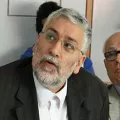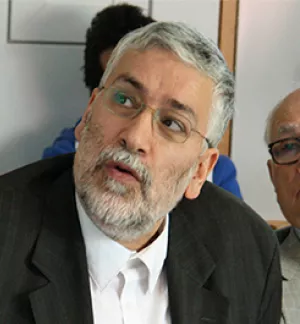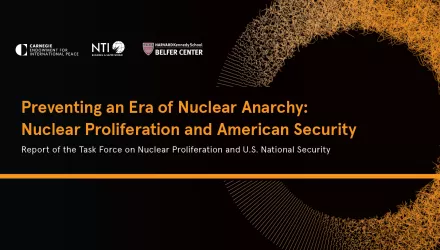As the UN Security Council debates Iran's nuclear program, a whiff of confrontation is in the air. Iran is a proud country with a tradition of resistance to foreign pressure and is likely to respond better to serious offers than to what it sees as blackmail. In response to Security Council sanctions, Iran might carry out its threat to pull out of nuclear Nonproliferation Treaty (NPT). Military strikes, and the inevitable Iranian responses, pose incalculable risks for all concerned. All sides need to look hard for new proposals to resolve the crisis before confrontation becomes inevitable.
Any viable solution needs to meet all sides' bottom lines. For Iran, this means reliable civilian nuclear energy, defense of its rights under the NPT, maintenance of its pride and technological development, and assurances against attack. For the United States and Europe, the bottom lines are no nuclear weapons in Iran; a broad and verifiable gap between the nuclear activities that would continue in Iran and a nuclear weapons capability; and full Iranian cooperation with verification (including resolving all questions about past nuclear activities). The West's longstanding complaints about Iran's other policies, and Iran's complaints about the West, must be addressed — but it is unlikely that all these problems can be solved in an initial nuclear deal.
The focus of nuclear concern is Iran's development of centrifuges for uranium enrichment — a technology Iran argues is needed to provide fuel for its planned reactors, but which could also provide nuclear bomb fuel. Once mastered, centrifuges are small and potentially easy to hide.
Russia has proposed a Russian-Iranian joint venture that would enrich fuel for Iran's reactors in Russia, without enrichment taking place within Iran itself. The venture would use Russian centrifuges, and Iranian scientists would not have access to them. Recent talks in Moscow and Tehran ran into roadblocks. Iran, which already has experience with delays in Russian nuclear supplies, insisted on continuing its own centrifuge development, which the United States and some European countries reject.
Russia's proposal could serve all sides' interests if coupled with several additional steps. First, all sides should agree on three steps to guarantee that fuel to Iran's reactors will not be cut off: (1) The major nuclear fuel suppliers should form a commercial consortium that would guarantee to step in if Russian supply was interrupted. (2) The United States, Russia, and other countries should contribute enriched uranium to an IAEA-controlled fuel bank whose rules would require it to provide fuel if there was an interruption of supply unless it was ordered not to do so by the Security Council. (3) Finally, Iran and the major powers should establish a stockpile of some three years' worth of nuclear fuel physically in Iran (much like the U.S. strategic petroleum reserve).
Second, Iran and the other parties in the dispute should launch a new multilateral forum to address all sides' political, security, and economic concerns. This forum should air the long-standing sources of U.S.-Iranian animosity, agree on steps to strengthen collective security in the Persian Gulf, and restart Iranian-European talks on a new trade pact.
Third, all participants (including the United States) should assure Iran that they will not attack or threaten to overthrow Iran's government as long as Iran complies with the nuclear deal and does not commit or sponsor aggression. Such a pledge is key to changing Iranian perceptions that Iran should retain a nuclear weapons option. Iran has already offered to sign mutual non-aggression pacts with its neighbors. If the United States can have such talks and pledges with North Korea, why not with Iran?
In return, Iran would agree that while it had every right to enrichment, it would not exercise this right for the time being (just as Americans have a constitutional right to have a gun but many choose not to do so). This approach would not require Iran to disavow any of its NPT rights to peaceful nuclear pursuits. Indeed, Iranian scientists should be invited to participate in international development of cutting-edge nuclear and non-nuclear energy technologies that pose little security risk. Iran would ratify the Additional Protocol (providing for broader IAEA inspections), and it would actively cooperate to clear up lingering questions from the IAEA, including voluntarily taking steps beyond the Additional Protocol.
Experts at MIT have proposed another approach that could resolve the impasse (if tailored to meet the bottom lines of all sides). A joint-venture enrichment plant could be established in Iran (meeting the Iranian desire for enrichment on their soil), but with an international staff on-duty round the clock, and using efficient European centrifuges enclosed in "black boxes" (meeting the Western demand that the approach not give Iran a leg up in centrifuge technology that could be applied to military use). Iran and European countries would jointly own the plant — possibly with Russia and China as well — making any attempt to shift it to weapons work also a seizure of other nations' property. They would manage it jointly, under continuous and intensive international inspection. (The "black box" arrangement is the same one planned to protect this proprietary European technology at a new plant in the United States.) This would be coupled with the no-attack commitment, political dialogue, verification steps, and halt to Iran’s own enrichment work described above.
Rather than rushing toward confrontation with all its risks, all sides must put historic antipathies aside and find face-saving solutions. To give the Iranian advocates of compromise a chance to succeed, the United States and the other major powers need to put offers on the table that will show the people of Iran that nuclear restraint and compliance will put their nation on a path toward peace and prosperity.
Bunn, Matthew and Abbas Maleki. “Finding a Way Out of the Iranian Nuclear Crisis.” Science, Technology, and Public Policy Program, Belfer Center, March 23, 2006





